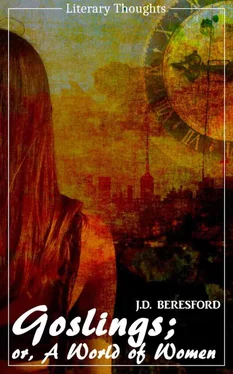The Daily Post replied next morning by pointing out that the celebrated professor of economics was nullifying all his own previous utterances on the case for Tariff Reform, but that retort carried little weight. No one cared if the professor contradicted himself; anyone, except the faddists, could see that the argument of the article was sound, in fact incontrovertible. What had to be done was to put pressure on the Local Government Board. It was true that the Daily Post, the semi-official organ of the Government, affirmed that the Board in question was alert and active, but that announcement was regarded as a cliché; what was wanted were particulars of the preventive measures that were being taken.
The members of the great Gosling family, in offices, warehouses and shops followed the line of least resistance, while making some assertion of their rights as citizens.
George Gosling’s arguments with his crony Flack were excellently representative.
“What yer think of this ‘closed door’ business?” asked Flack.
“Goin’ a bit too far, in my opinion,” returned Gosling judicially.
Flack’s natural incredulity had inclined him in the same direction, but his colleague’s certainty swung him round at once.
“I ain’t so sure o’ that,” he said. “Looks to me as things is going pretty bad.”
“Bad enough, I grant you,” returned Gosling. “But there isn’t no need for us to lose our ’eads over it. Take it all round, you know, it’s pretty certain as things isn’t as bad as is made out, whereas, on the other ’and, the ‘closed door’ policy’d mean ruin and starvation for ’undreds of thousands—there’s no gettin’ round that.”
“Better a few ’undred thousands than the ’ole male population,” said Flack.
“If it come to that, but it won’t; no fear, not by a long chalk, it won’t,” replied Gosling. “What’s got to be done is to get the Local Government Board to work. We’ve got to ’ave a regular system o’ quarantine established, that’s what we’ve got to ’ave.”
It did, indeed, appear the most practical form of prevention at the moment; it is hard to see what other measures could have been adopted. The supporters of the “closed door” policy soon began to lose adherents. The scheme was obviously alarmist, far-fetched and utterly impracticable....
4
Through February and the early part of March the plague spread through Central Europe, but not with an alarming rapidity.
In the second week of March, Berlin was reporting a weekly roll of over five hundred deaths attributable to this cause, and Vienna was second with between four and five hundred. In St Petersburg and Moscow the figures were no higher, and there were as yet comparatively few cases in France, and none in Spain or Portugal.
Many authorities were of opinion that the mortality had reached the maximum, and that the plague would work itself out in the course of a few more weeks. Moreover it appeared that the early reports of the highly infectious character of the plague must have been grossly exaggerated, for as yet there had been not a single case in the British Isles despite the enormous traffic between England and the Continent. It is true that the strictest quarantine had been established—it had been ascertained that the period of gestation of the germ was about fifty hours—but not one single case had so far been detained in quarantine ships or hospitals. It was argued from this that the plague was not infectious at all in the ordinary sense, and only mildly contagious; that it flourished in certain centres and was not easily transferable from one centre to another.
The only aspect of the thing that was seriously alarming was the horrible mortality among doctors and the specialists who were endeavouring to recognize and isolate the characteristic germ of the disease. Nine English experts who had dared martyrdom in the cause of science had gone to Berlin to make investigations, and not one of them had returned. As a consequence of this strange susceptibility of the investigator, whether medical man or bacteriologist, there was still an extraordinary ignorance of the general nature and action of the disease.
Nevertheless, despite this one intimidating aspect of the plague, the general attitude in the middle of March was that the quarantine arrangements were enormously impeding trade and should be relaxed. The foreign governments were alive to the seriousness of the scourge, and were doing all in their power to prevent infection. There had been a scare, but people were calm again, now, and able to realize the extent of the earlier exaggerations.
The Government passed the second reading of the English Church Disestablishment Bill by a majority of nineteen, before the Easter recess, and the Goslings, who had grown used to the plague, whose chief attitude towards it was that it was an infernal nuisance which interfered with trade, turned their attention gladly to the new topic; they all thought that a general election at that moment would result in an overwhelming Conservative majority. And as the Liberals had been in power for more than ten years, that eventuality was regarded with complacency.
But at this critical moment—to the joy of the Evangelicals—the new plague set to work in earnest.
1
Russia was smitten. Once more communication was cut off from Moscow, this time by a different agent. The work of the city was paralysed. Men were falling dead in the street, and there were only women to bury them. A wholesale emigration had begun. The roads were choked with people on foot and in carriages, for the trains had ceased to run.
The news filtered in by degrees: it was confirmed, contradicted and definitely confirmed again every few hours.
Then came final confirmation, with the news that something approaching war had broken out—a war of defence. Germany had sent troops to the frontier to stem the tide of emigrants from smitten Russia and Poland; and Austria-Hungary was following her example.
Parliament re-assembled before the Easter recess had expired. The time for more drastic measures had come, and the Premier explained to the House that it was proposed to bring in a Bill immediately to cut off communication with Europe.
There can be no doubt that England was now badly scared, but centuries of protection had established a belief in security which was not easily shaken.
The enthusiasts for the “closed door” policy found plenty of recruits, but on the other side there was a solid body of opinion which maintained that the danger was grossly exaggerated. And when the Evening Chronicle came out with a long leader and a backing of expert opinion, to prove that the “Closed Door” Bill—as it was commonly called—was a dodge of the Government’s in order to retain office, a well-marked reaction followed against the last and terrible step of cutting off all communication with Europe; and the Conservative party was joined by some avowed Liberals who had personal interests to consider in this connexion.
In committee-rooms, members of the Opposition were inclined to be jubilant: “If we can throw out the Government on this Bill we shall simply sweep the country ... all the manufacturers in the North will be with us ... even Scotland, most likely ... we should come back with a record majority....”
The prospects were so magnificent that there could be no hesitation in making a party question of the Bill.
No time was to be lost, for the Bill was to be rushed, it was an emergency measure, and it was proposed that it should become law within four days. Preparations were already in hand to carry out the provisions enacted.
An urgent rally of the Opposition was made, and when the Bill came up for the second reading the Premier addressed a well-filled House. The House was not crowded because a large number of people, including many members of Parliament, were on their way to America. All the big liners were packed on their outward voyage and were returning, contrary to all precedent, in ballast—this ballast was exclusively food-stuffs.
Читать дальше












